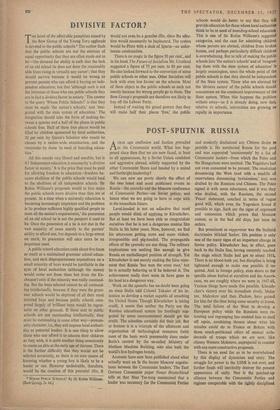DIVISIVE FACTOR?
THE latest of the admirable pamphlets issued by the Bow Group of the Young Tory eggheads is devoted to the public schools.* The author finds that the public schools are not the enemies of equal opportunity that they are often made out to be—`the demand for ability is such that the lack of an old school tie does not deter the reasonably able from rising in virtually any career'; that they should survive because it would be wrong to prevent parents who can afford it buying an inde- pendent education; but that 'although such is not the intention of those who run public schools they are in fact a divisive factor in society.' The answer to the query 'Whose Public Schools?' is that they must be made 'the nation's schools,' and 'inte- grated with the state system of education.' The integration should take the form of making be- tween a quarter and a half of the places in public schools free. Half of these free places would be filled by children sponsored by local authorities, 20 per cent. by Queen's Scholars who would be chosen by a nation-wide examination, and the remainder by those 'in need of boarding educa- tion.'
All this sounds very liberal and sensible; but is it? Independent education is necessarily 'a divisive factor in society.' It is the price that must be paid for allowing freedom in education—freedom be- cause abolition of the public schools would lead to the abolition of all independent schools. Sir Robin Williams's proposals would in fact make the public schools more divisive than they are at present. At a time when a university education is becoming increasingly important and the problem is `to produce sufficient highly qualified people to meet all the nation's requirements,' the possession of an old school tie is not the passport it used to be. Once the possession of a tie is not due in the vast majority of cases merely to the parents' ability to afford one, but depends to a large extent on merit, its possession will once more be an important asset.
A public school education costs about five times as much as a maintained grammar school educa- tion, and such disproportionate expenditure on a small minority of boys would be justifiable in the eyes of local authorities (although the money would come not from them but from the Ex- chequer) only if the minority was really outstand- ing. But the boys selected cannot be all outstand- ing intellectually, because if they were the gram- mar schools would be deprived of all their most talented boys and because public schools com- posed largely of brilliant boys would be regret- table on other grounds. If those sent to public schools are not outstanding intellectually, they must be outstanding in some other way—presum- ably character, i.e., they will impress local authori- ties as potential leaders. It is one thing to allow those who can afford it to educate their children as they wish, it is quite another thing consciously to create an elite at the early age of thirteen. There is the further difficulty that they would not be selected accurately, as there is no sure means of knowing whether a young boy is likely to be a leader or not. However undesirable, therefore, would be the creation of this potential elite, it * WHOSE Punic SCtoOLs? By Sir Robin Williams. (Bow Group, 2s. 6d.) would not even be a genuine Rite, since the selec- tion would necessarily be haphazard. The system would be Plato with a dash of Sparta—an unfor- tunate combination.
There is no magic in the figure 50 per cent., and in his book The Future of Socialism Mr. Crosland suggested a figure of 75 per cent. to 80 per cent. He also looked forward to the conversion of some public schools to other uses. Other Socialists will look with even less favour on the scheme. Most of them object to the public schools as such not merely because the wrong people go to them. The Bow Group's proposals are therefore not likely to buy off the Labour Party.
Instead of making the grand gesture that they will make half their places 'free,' the public schools would do better to say that they will provide education for those whom local authorities think to be in need of boarding-school education. This is one of Sir Robin Williams's suggested categories, and the case for admitting children whose parents are abroad, children from broken homes, and perhaps particularly difficult children is overwhelming. But to talk of making the public schools into 'the nation's schools' and of 'integrat- ing them with the state system of education' is largely meaningless, since the whole point of the public schools is that they should be independent of the State system. Those who are alarmed by the 'divisive nature' of the public schools should concentrate on the continued improvement of the State system. When this happens the problem withers away—as it is already doing, now that, relative to schools, universities are growing so rapidly in importance.






































 Previous page
Previous page